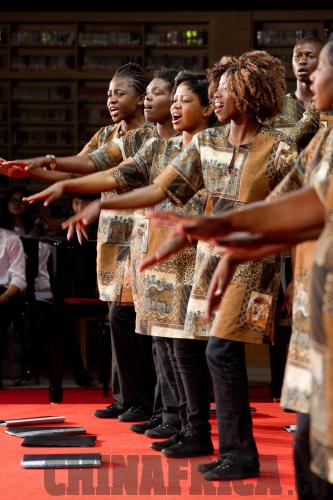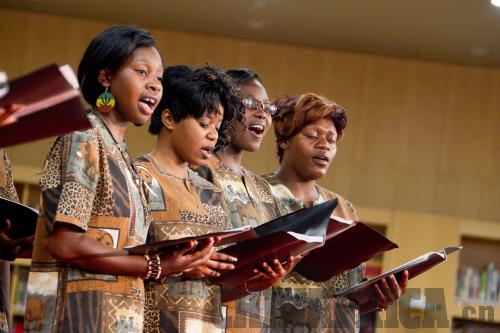|
 |
|
Precious Voices: Zimbabwean choir Divine Jewels performed Chinese songs at Beijing's National Center for the Performing Arts in July |
In 2010, the choir Divine Jewels was formed at the Zimbabwe College of Music in Harare. This past July, its members arrived in Beijing to give a performance at the city's National Center for the Performing Arts. Their excellent renditions of Chinese songs impressed many Chinese music fans and students present at the concert. Rachel C. Jera-Chigwanda, Deputy Director at the Zimbabwean music school, opened up about the experience with ChinAfrica.
How did this trip happen?
China's Vice Minister of Culture visited Zimbabwe last year, and when she arrived, she visited the Zimbabwe College of Music. We sang a Chinese song for her and the vice minister was impressed by our performance. To our surprise, we got invitation from her to visit China. It was really great news for us; I don't think any of our members had been to China before. Performing in a faraway country, for a different community, is something we really look forward to. So when we got the invitation, we thought we shouldn't come here with only one song. We edited more songs, and in Beijing we performed five Chinese songs.
What did you find difficult about learning Chinese songs?
At first, we thought we were singing correctly – until we invited Chinese lecturers teaching in Zimbabwe to come to listen to us before our trip. They began teaching us how to pronounce the Chinese words, and we came up with different versions from the ones we were doing. Every Wednesday night, the lecturers came to give instruction between five to eight o'clock. They read and recorded word by word. For two months, we listened to CDs for practice every day. When the lecturers came back, they found us at a different level. They also explained each song, because if it's a love song or happy song, you really need to express the mood. So we really want to get the meaning of the lyric first

What would you say is the difference between Chinese and African music?
Based on what we are singing now, we think Chinese music is soft and cool. It expresses emotions like love, but also history. We learned a lot from Defend the Yellow River which is about history between China and Japan. And when we sing love songs, these really give us a picture that the Chinese are loving people.
There are great differences between African and Chinese music. Chinese music has simple rhythms while African musical rhythms can be a bit complicated and sometimes difficult for a person to learn. Also, you can't separate African music from African dance. It needs to be done with dancing, and each song is accompanied by its own unique dance. That's the uniqueness of African music. We [the choir] tend to mix African dances with Chinese songs because it's very difficult for us to only sing. So, we use our traditional drums to insert African rhythms where we can. It's great to always make something new by mixing Chinese music with African culture.
Has this mixing helped you to learn more about Chinese people?
When we are in Zimbabwe, there's always noise and laughter. But in China, even in the hotel we stayed, we found it too quiet. But we connected the music with the people. We sang the soft music and looked forward to meeting soft people here – and we really did. Through singing these songs, we now understand Chinese people are quiet and a bit reserved, but we also invited them to make noise.
I think that music really needs more promotion. So much can be learned through music – you can learn about Chinese culture and Chinese people through music. It also makes communication possible. If I take a Chinese person to Zimbabwe, just putting people together without music, you will just see them sitting and not speaking. But with music you will find them chatting. Music is an international language. |